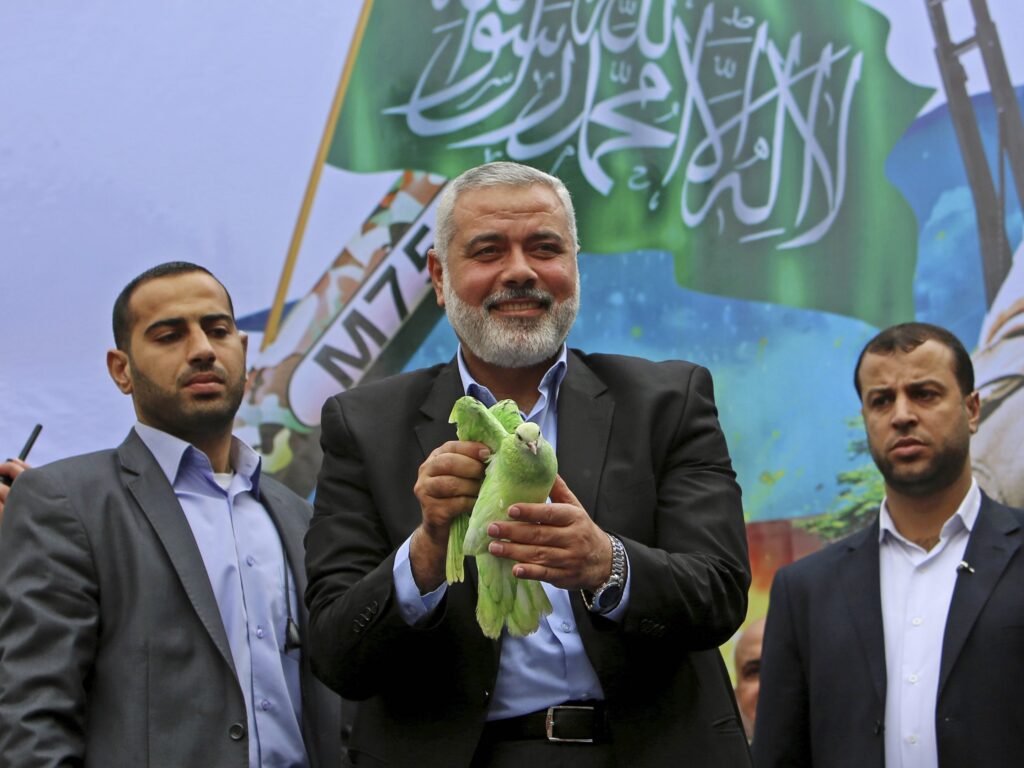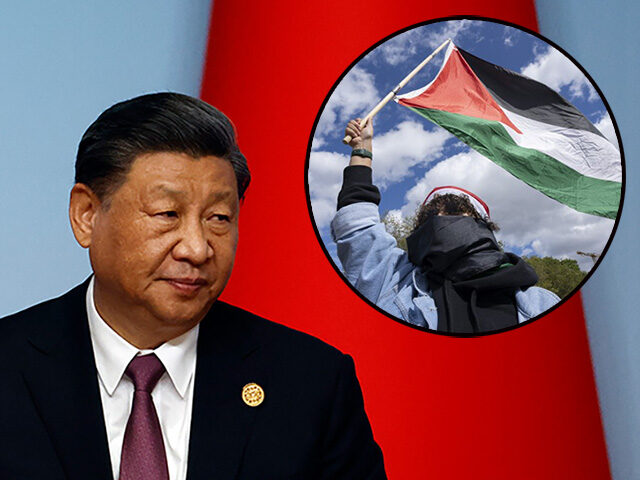China sent a delegation to Qatar to meet with the head of the jihadist terrorist organization Hamas, Ismail Haniyeh, the Foreign Ministry revealed on Tuesday, reportedly telling him that Beijing is “keen on relations” with the genocidal group.
The encounter is the first of its kind between the Chinese government and Hamas since October 7, when the terrorists executed an unprecedented siege of Israel that resulted in an estimated 1,200 deaths, the abduction of an estimated 250 people, and a spree of torture, gang rape, and the desecration of the dead. The “al-Aqsa flood,” as Hamas terrorists refer to the attack, is widely considered the largest single-day slaughter of Jews since the Holocaust.
Hamas is a Sunni terrorist organization that enjoys funding from key China ally Iran and has openly called for the destruction of Israel and the elimination of Jewish people from the territory. The Chinese Communist Party has been largely favorable to Hamas since October 7, particularly at international venues such as the United Nations and BRICS coalition meetings, despite Beijing orchestrating an ongoing genocide of Turkic Muslims in occupied East Turkistan and justifying it by claiming it is necessary to prevent terrorism. China has similarly supported the geopolitical goals of other jihadist terrorist groups despite its claim to oppose radical Islamic terrorism, most notably the Afghan Taliban.
The Chinese Foreign Ministry confirmed the meeting with Haniyeh on Tuesday in a statement that offered almost no information beyond the fact that the meeting occurred.
“On March 17, 2024, Ambassador Wang Kezhuo of the Ministry of Foreign Affairs met with the President of the Hamas Political Bureau, Haniyeh, during his visit to Qatar and exchanged views on issues such as the Gaza conflict,” the statement read.
During its regular press briefing on Tuesday, the Foreign Ministry refused to offer any more information, Newly minted spokesman Lin Jian addressed the situation in the Middle East only in the context of the Palestinian Authority appointing a new “prime minister,” Mohammad Mustafa.
“Any arrangement concerning the future and destiny of Palestine must follow the principle of ‘the Palestinians governing Palestine’ and fully reflect the Palestinians’ aspirations,” Lin said. “China stands ready to work with all parties to deescalate the current tensions and bring the Palestinian question back to the right track of the two-State solution.”
Prior to the confirmation on Tuesday, the Jerusalem Post reportedly that the meeting between Haniyeh and Wang occurred on Sunday. It claimed that Wang told the Hamas terror leader that China believed Hamas “is part of the Palestinian national fabric and China is keen on relations with it.”

File/Palestinian top Hamas leader Ismail Haniyeh holds a dove sprayed in green color before he releases it during a rally to commemorate the 27th anniversary of the Hamas militant group, at the main road in Jebaliya in the northern Gaza Strip, Friday, Dec. 12, 2014. (AP Photo/Adel Hana)
Wang claimed that China had a “close and historic relationship” with “the Palestinian people.”
Hamas published its own statement on the social media outlet Telegram confirming the meeting and noting that Chinese Ambassador to Doha Cao Xiaolin also attended the meeting. Haniyeh and Hamas’s “political” leaders live in luxury in Qatar, granting the country a mediator role between the terrorists and the free world.
According to the Middle East outlet Al-Monitor, Haniyeh pressured China to help Hamas “end the Israeli bombardment of the Gaza Strip and see the displaced return home, as well as for the withdrawal of Israeli forces from the enclave.” He also demanded help in establishing a Palestinian state headquartered in Jerusalem, the capital of Israel.
Following the October 7 atrocities, the Israeli government launched a self-defense operation in Gaza, which Hamas has governed since winning the last elections there in 2006. Israeli Prime Minister Benjamin Netanyahu has faced significant pressure from leftist American President Joe Biden, expected to be Israel’s closest ally on the world stage, to stop the operations in Gaza and give Hamas time to thrive. Biden has particularly opposed Israel Defense Forces (IDF) operations in Rafah, the last Hamas stronghold in Gaza.
“The majority of Israelis understand that if we don’t do this, what we’ll have is a repetition of the October 7th massacre, which is bad for Israel, bad for the Palestinians, bad for the future of peace in the Middle East,” Netanyahu said in an interview last week, addressing tensions with Biden. “So, the attempt to say that my policies are my private policies that are not supported by most Israelis, is false. The vast majority are united as never before.”
Hamas also claimed this week that, during his meeting with the Chinese diplomats, Haniyeh “praised the role that China plays in the Security Council, the United Nations, the International Court of Justice, and in sending humanitarian aid to the Gaza Strip.”
China took over the presidency of the U.N. Security Council in November for the typical one-month term, taking the helm at a critical time in the immediate aftermath of the October 7 attack. It used the position to demand a “ceasefire” on the part of the IDF and block attempts to support Israel’s right to self-defense.
China also hosted a summit of Arab nations in November in which leaders loudly echoed Hamas’s political positions.
“China is a good friend and brother of Arab and Islamic countries. We have always firmly safeguarded the legitimate rights and interests of Arab (and) Islamic countries and have always firmly supported the just cause of the Palestinian people,” Chinese Foreign Minister Wang Yi said at the time.
Chinese dictator Xi Jinping has personally weighed in on the conflict to demand Israel stop defending itself.
“Stop all violence and attacks against civilians, release civilians held captive, and act to prevent loss of more lives and spare people from more miseries,” Xi ordered Israel in remarks in November, his first time discussing the matter publicly, during an emergency meeting of the BRICS coalition. “The collective punishment of people in Gaza in the form of forced transfer or water, electricity and fuel deprivation must stop.”
BRICS originally consisted of China, South Africa, Brazil, India, and Russia, but accepted five new members in January: Iran, Egypt, the United Arab Emirates (UAE), Ethiopia, and Saudi Arabia. As of February, Saudi Arabia – Iran’s longtime geopolitical rival – had not completed the process to fully integrate into BRICS.
Elsewhere at the event, Xi asserted, “the only viable way to break the cycle of Palestinian-Israeli conflict lies in the two-state solution, in the restoration of the legitimate national rights of Palestine, and in the establishment of an independent State of Palestine.”

COMMENTS
Please let us know if you're having issues with commenting.